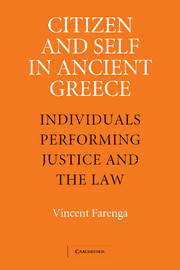Book contents
- Frontmatter
- Contents
- Acknowledgments
- Introduction
- 1 Justice to the Dead: Prototypes of the Citizen and Self in Early Greece
- 2 Performing Justice in Early Greece: Dispute Settlement in the Iliad
- 3 Self-Transformation and the Therapy of Justice in the Odyssey
- 4 Performing the Law: The Lawgiver, Statute Law, and the Jury Trial
- 5 Citizenship by Degrees: Ephebes and Demagogues in Democratic Athens, 465–460
- 6 The Naturalization of Citizen and Self in Democratic Athens, 450–411
- 7 Democracy's Narcissistic Citizens: Alcibiades and Socrates
- Conclusion
- References
- Index
5 - Citizenship by Degrees: Ephebes and Demagogues in Democratic Athens, 465–460
Published online by Cambridge University Press: 23 July 2009
- Frontmatter
- Contents
- Acknowledgments
- Introduction
- 1 Justice to the Dead: Prototypes of the Citizen and Self in Early Greece
- 2 Performing Justice in Early Greece: Dispute Settlement in the Iliad
- 3 Self-Transformation and the Therapy of Justice in the Odyssey
- 4 Performing the Law: The Lawgiver, Statute Law, and the Jury Trial
- 5 Citizenship by Degrees: Ephebes and Demagogues in Democratic Athens, 465–460
- 6 The Naturalization of Citizen and Self in Democratic Athens, 450–411
- 7 Democracy's Narcissistic Citizens: Alcibiades and Socrates
- Conclusion
- References
- Index
Summary
CITIZENSHIP AND MANHOOD
In Book 3 of his History, Thucydides describes a civil war gripping the city-state of Corcyra in 427, but this event inspires him to sketch out a portrait of factional strife between democrats and oligarchs everywhere in Greece where Athenian–Spartan hostilities provoked “the same human nature” (3.82.2) to acts of hostility and brutality (82.1, 82.3 and 83.1). His portrait highlights several variations on the basic script “how citizens deliberate,” and the cumulative effect of this script's several tracks dramatizes how citizens individually and in factions can assume performative attitudes toward one another which produce (in Taylor's terms) “webs of interlocution” and a “for-us” public space that is actually degenerative to city-state community. By this I mean that, in these quickly sketched variations, deliberating citizens believe they are following a familiar script to achieve the consensus necessary for dikê and nomos, but in reality their deliberations sabotage the goals of the script in question and push their communities beneath the threshold of statehood. The tracks include: “forming an alliance” (82.1–3); “interpreting the habitual meanings of language” (82.3–4); “evaluating the deliberator” (82.5–6); and “how to achieve consensus” (82.6–7).
If it is true that these citizens show how a city-state can fall beneath the threshold of statehood when they depart from the goals of deliberation, then it's reasonable to ask whether as deliberators they push themselves beneath the threshold of citizenship itself. What might it mean to regress from the ability to speak, think, and respond like a citizen?
- Type
- Chapter
- Information
- Citizen and Self in Ancient GreeceIndividuals Performing Justice and the Law, pp. 346 - 423Publisher: Cambridge University PressPrint publication year: 2006



